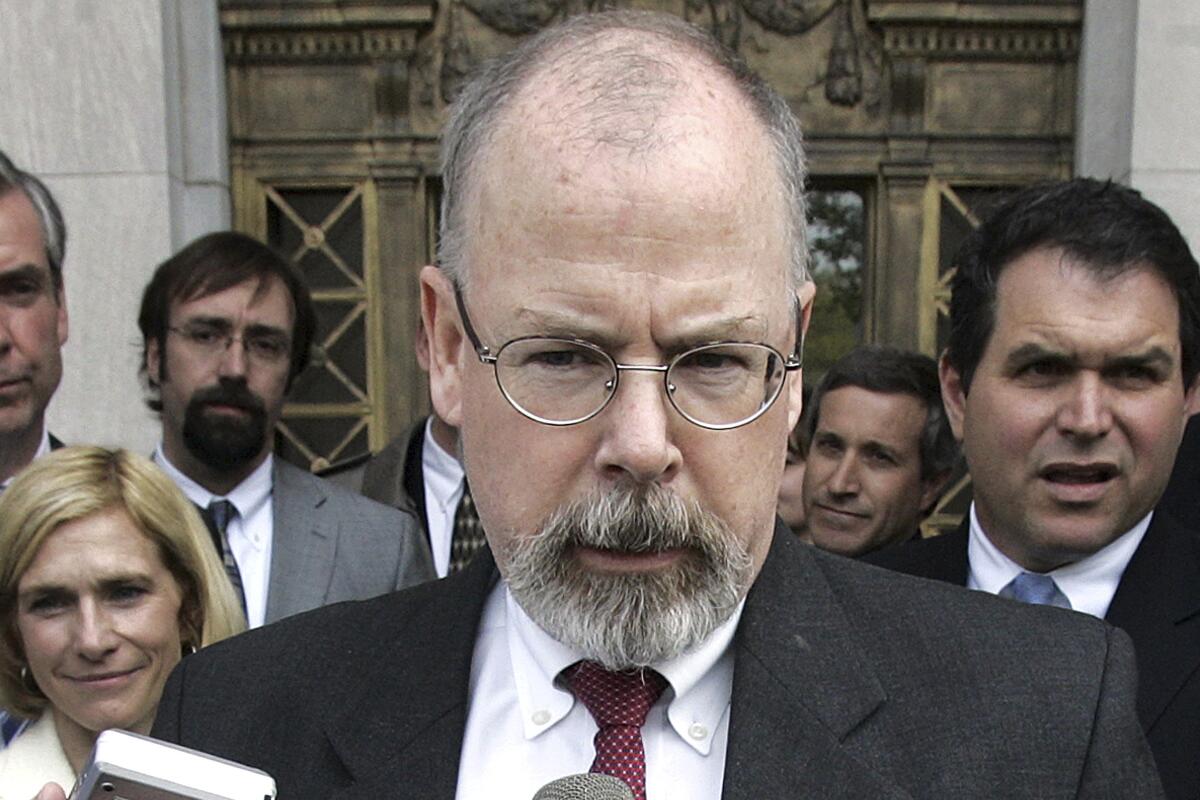Op-Ed: The ‘Russia hoax’ probe netted one guilty plea, but it won’t put away Trump’s tormentors

- Share via
John Durham, the U.S. attorney appointed by Atty. Gen. William Barr to investigate the origins of the Russian probe, now has something to show for his work.
But not much.
On Tuesday, former FBI lawyer Kevin Clinesmith pleaded guilty to Durham’s charge that he falsified a document: He added his own words to another’s email and forwarded it up the line.
Clinesmith was helping to gather information for a renewal of the Department of Justice’s court-granted permission to surveil Carter Page (Remember him? Foreign policy advisor to the Trump campaign in 2016). In discussions and correspondence, a CIA agent indicated Page “was or is [digraph]” — a digraph is a two-letter combo; in this case, coded CIA-speak for someone in the agency’s orbit but not a formal, full-fledged “source.”
Pressed by a superior for certainty that Page was indeed not a source, Clinesmith, rather than contacting the CIA agent to relay the request, summed up his understanding of the situation, inserting “and not a source” into the email. He says he believed it was an accurate description of Page’s status, though he surely knew he was cutting corners. Durham doesn’t assert Clinesmith intended to mislead. The charged falsity is the mere alteration of the email, not its content.
As Barr himself said on Fox News, Clinesmith’s plea was “not earth-shattering.” But that hasn’t stopped the president and his allies from making the Clinesmith case a portent of future prosecutions against FBI brass and “the Obama-Biden Administration” for spying on his 2016 campaign.
“So that’s just the beginning,” President Trump crowed. “The fact is they spied on my campaign and they got caught. And you’ll be hearing more.” Sen. Lindsey Graham (R-S.C.) was among the cheerleaders who seconded that sentiment.
The situation, however, doesn’t begin to support that narrative, the Trumpian claim that a “deep state,” including special counsel Robert S. Mueller III and former FBI head James Comey, launched an attack to bring Trump down.
For starters, the Clinesmith case is literally old news. Everything about the episode (except for Clinesmith’s name, which had nevertheless been leaked ) appeared in the December 2019 report by the Justice Department’s inspector general, Michael Horowitz, who had looked into agency wrongdoing related to the Russia investigation. For Durham, “getting” Clinesmith was the lowest of low-hanging fruit.
And Horowitz, who detected 17 significant errors or omissions in the FBI’s surveillance-warrant process — specifically found no evidence of bias or improper motives on the part of the agency.
Worse for Trump’s conspiracy theory, the offense to which Clinesmith pleaded guilty occurred in June 2017, well after the president took office. There’s no way of tying the altered document to a spying plot on the part of the previous administration. Besides, Durham’s charging document clearly portrays Clinesmith as a lone actor.
It’s even debatable whether Clinesmith’s conduct is a crime at all. The statute under which he was convicted requires proof that he added the words and forwarded the email “knowing the same to contain any materially false, fictitious, or fraudulent statement or entry.” The judge at his plea hearing asked Clinesmith if, when he added “and not a source” to the email, that he knew it was “in fact not true.”
There followed a prolonged, awkward silence. Finally, Clinesmith told the court: “At the time I thought the information I was providing was accurate, but I am agreeing the information I inserted was not originally there, and I inserted the information.”
From my vantage point as a former prosecutor, that comes up short of what the statute requires the government to prove. If he chooses to pursue it, Clinesmith may have a strong argument on appeal.
Still, there’s no arguing that Clinesmith did something very unprofessional and very wrong. It’s just more consistent with a junior lawyer trying to placate a supervisor who wanted a quick black-and-white answer than with a broad conspiracy aimed at Trump.
That’s not to say Durham has no more cards to play. He may convert others of the errors Horowitz listed into criminal cases. And Durham is expected to issue a report (likely sometime in the 90 days before the election, in flat contravention of Justice Department policy designed to prevent its inquiries from affecting a presidential race).
Of course, no clear-eyed analysis of the Clinesmith charging documents or the Horowitz findings will prevent Trump and his die-hard supporters from crowing that the boom is about to be lowered on all of Trump’s tormenters, up to and including Mueller, Comey and even Obama. It’s propaganda, more twisting of the truth from a White House that has made lying into a physical law of American politics. The best defenses for now are noise-cancelling headphones and a mail-in ballot.
More to Read
A cure for the common opinion
Get thought-provoking perspectives with our weekly newsletter.
You may occasionally receive promotional content from the Los Angeles Times.










